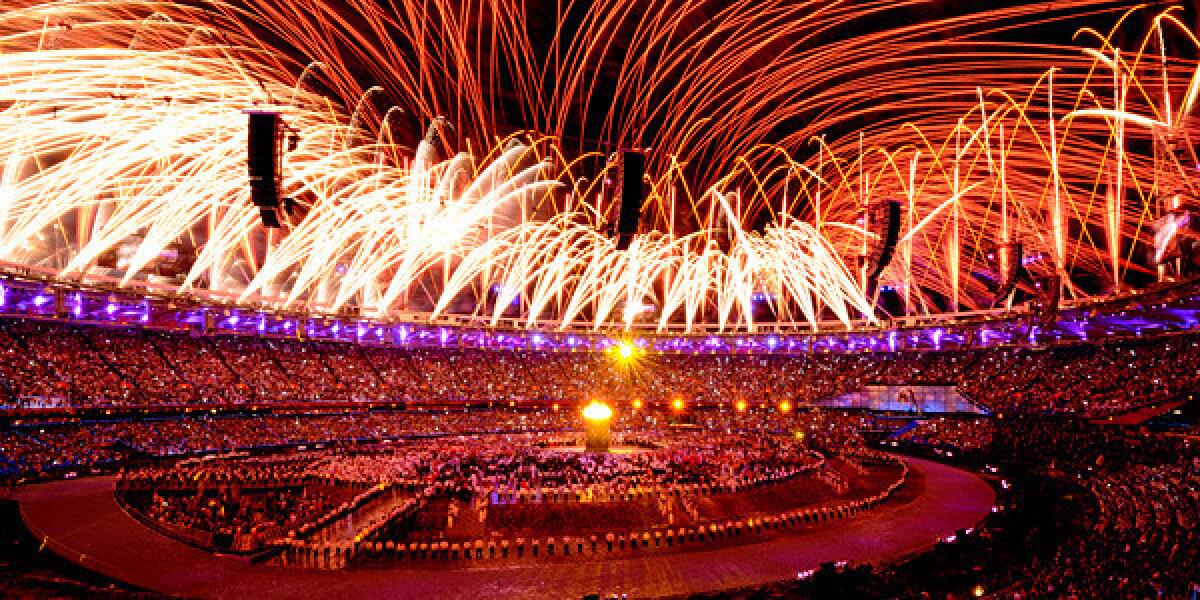Review: NBC’s stumble can’t mask Olympics’ beautiful opening ceremony

Through a fortuitous series of events, because someone knew someone who knew someone, I watched Friday’s remarkable opening ceremony of the London Olympic Games by way of the BBC — which is to say, without commercials or Ryan Seacrest and with relatively little intrusion from the commentators. Later, I saw what the United States saw.
Fellow Americans, you have my sympathy.
Titled “Isles of Wonder” and conceived by Danny Boyle, the director of”Slumdog Millionaire,” it was by turns moving, bizarre, funny and exciting and often surprisingly dark. It included the queen, in a James Bond parody, seeming to parachute into the Olympic stadium (“I hope it made people laugh,” she was heard to say the next day), a troop of Mary Poppinses vanquishing Lord Voldemort, a pastoral village destroyed by the dark satanic mills of the Industrial Revolution, and a musical trip through time culminating in the invention of the World Wide Web.
It had at times a quality of seeming completely random even as one suspected that repeated viewings would reveal all sorts of connections and echoes and interior rhymes. If there were a through-line to be untangled from its $42-million, cast-of-thousands, higgledy-piggledy progress through modern Britain, it might be something like, “Sorry for the unintended consequences, but we did give you steam engines, great pop music and comedy and the roots of social networking. It was ugly there for a while, but we’re all right — and everybody dance now.”
PHOTOS: London Olympics opening ceremony
On the BBC, this ran as a seamless four-hour stream. On American television, it ran half an hour longer to accommodate commercials, with additional time carved out of the show itself, destroying its pace and shape. Controversially, NBC cut an entire sequence, Akram Khan’s dance on the theme of mortality, which served as a meditative transition between Boyle’s main show and the parade of athletes, in favor of Seacrest’s perfectly unenlightening interview with swimmer Michael Phelps.
The commentary was by Bob Costas, NBC’s veteran voice of the Olympics; “Today” host Matt Lauer; and his former co-host Meredith Vieira. They are all in the talking business — silence (that is, the absence of talk) is as good as dead air — and in the absence of anyone else to interview, they will inquire unto themselves: When Lauer said, during a tribute to the National Health Service, “I am sitting here watching this, I’m thinking what an incredible experience for these doctors and nurses. They’re looking around them in this Olympic stadium thinking, ‘My goodness, I’m part of something incredibly special,’” he was only telling you about Matt Lauer, sitting and thinking and claiming to know what other people were feeling.
That is worse than saying nothing at all.
GRAPHIC: Your Olympics TV-watching guide
In defending its decision not to live-stream Friday’s proceedings — an economic decision (making people watch ads) it attempted to cast as an aesthetic one (advancing television as the “medium that best demonstrates their grandeur and majesty”) — NBC sought to delineate a difference between the Games, which it is streaming whole, and the framing ceremonies, which it termed “entertainment spectacles.”
I see less of a difference. Because although unquestionably a sporting event, the Olympic Games are also a kind of theater, an unscripted performance on the theme of athletics as much as an athletic contest in fact.
They draw viewers who otherwise might spend no time thinking about such things and weave them in with narratives of individual excellence, hardship overcome and global unity (within a framework of global competition) that are difficult to resist. This quality has been amplified in recent years by the ceremonies that celebrate them; these can waver between magic and kitsch, between austere beauty and manipulative sentiment, but there is nothing on Earth to match them in scale or reach.
And as theater, these ceremonies are also a kind of sport, with each successive host nation striving to outdo the last. For many years, the parade of competing athletes was the spectacle; thematically, it’s still the heart of the show, a many-colored cavalcade of gorgeous humanity that stays unchanging within the Games’ changing contexts. Now, without losing its inspirational glow, it has become a kind of breather between the high-tech wonders of the first act and the final uplift of the oath-taking, flag-raising, torch-lighting finale.
Saturday’s broadcast, in which the Games officially began, was the familiar mix of crafted drama, emphasizing rivalries and obstacles; athletes being asked “How do you feel?” before and after wins or losses; and commentary that ran from the unhelpfully aphoristic to the technically enlightening. Costas’ summaries sound smart; new kid Seacrest, here I guess for youth appeal, filed a filmed interview with Phelps, his mother and sisters that was cute, for better or worse, but it’s still too soon to judge his usefulness here.
But it is all beautiful and thrilling to behold, and whenever the professional talkers begin to pall, it proves just as beautiful and thrilling with the sound down.
ALSO:
NBC finds vindication in opening ceremony record
Olympic champions have a history with Hollywood
Video: USA Olympic Swim Team gets its ‘Call Me Maybe’ going
More to Read
The complete guide to home viewing
Get Screen Gab for everything about the TV shows and streaming movies everyone’s talking about.
You may occasionally receive promotional content from the Los Angeles Times.







